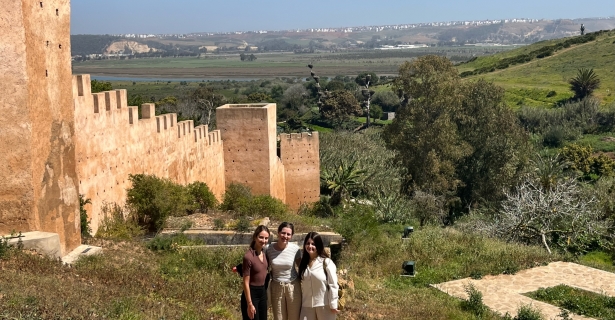Sitting in the Rabat Salé airport at 3:30 am I blearily think back over our 6 packed days in Morocco. The days flew by filled with interviews, sightseeing, exploring new neighborhoods and eating incredible food. We all feel a sense of deep gratitude for the generosity and kindness that we were shown by everyone that we met during our time in the country.
I think back to Tuesday when we sat in the sociology department office at the faculté des lettres et des sciences humaines of Hassan II University listening to the sounds of traffic, construction, and students hanging out in the sunny courtyard outside. Youness Benmouro, a professor of sociology, explains the concept of liminality in migration studies, which describes the phase of ambiguity when migrants enter into a new country, in this case Morocco, and are faced with new norms and laws that strip of them of their defining characteristics. Their identity becomes defined solely by being a migrant, with an association with criminality if they entered illegally. His work is particularly pertinent to my topic of sub-Saharan migration into Morocco and the way that the migration question is present in Morocco’s relationship with other African countries as his research attempts to identify mobility along the Sahelo-Saharan routes and migratory immobility during the stage of waiting in Morocco for migrants in irregular situations.
This conversation is particularly interesting after our discussion with ASTICUDE, an organization based in Nador that works to achieve inclusive, egalitarian and equitable access to political, economic and cultural decision-making, by contributing to producing a local elite capable of raising the challenges of development . Given the location of Nador 10km away from Melilla, one of the two Spanish enclaves in Morocco, many migrants who hope to reach Europe take shelter in the forest between the city and the border before attempting to cross. The organization works with migrants who are in this waiting phase before they attempt to cross the border into Melilla or after an unsuccessful attempt when they have to decide what to do next.
After a total of 10 interviews we are leaving with a wealth of new knowledge and connections. From experts on land and women rights to climate migration and census planning they exposed us to topics that we have studied in the classroom as well as ones that were completely new to us. We are so grateful for the continued support of the IGL and Tisch College, as well as all of our contacts for their support in making this trip a reality!

